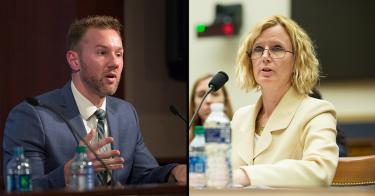Heritage Foundation scholars are helping our leaders find solutions to some of the biggest issues confronting America and the world. Heritage experts regularly testify before Congress, and recently Lora Ries, Brent Sadler, and Nick Loris all appeared before lawmakers.
Loris, deputy director of Heritage’s Roe Institute and Herbert and Joyce Morgan fellow in energy and environmental policy, testified to the House Subcommittee on Europe, Energy, the Environment and Cyber at a hearing titled “Restoration of the Transatlantic Dialogue: The Global Fight Against Climate Change.”
He spoke to the importance of working with our allies abroad to create a robust, consumer-focused strategy to reduce greenhouse gas emissions and stimulate economic growth in addition to holding the biggest emitters like China accountable.
“A lot of the climate goals [from the Paris Climate Accords] will not be met because the growth of emissions from China is going to continue to develop,” Loris testified. “Even though they've paid some lip service to ... trying to achieve net zero [emissions] by 2060, actions speak louder than words and given the fact that they've underreported a lot of their environmental problems ... it's fundamental to hold them accountable.”
Video of the hearing, starting at Loris’ testimony, is below.
Lora Ries, in her testimony to the U.S. House Subcommittee on Border Security, Facilitation, and Operations during a hearing titled “Unaccompanied Children at the Border: Stakeholder Perspectives on the Way Forward,” argued that the current immigration crisis involving unaccompanied alien children (UACs) at the southern border is caused by a combination of two factors.
As a former deputy chief of staff at the U.S. Department of Homeland Security during the Trump administration, Ries has an informed perspective on border security. She is a senior research fellow for homeland security at Heritage and director of the Center for Technology Policy.
First, lax enforcement and detention policies lead migrants to be quickly caught at the border and then released into the interior of the United States, resulting in a “catch and release” posture.
Secondly, the Trafficking Victims Protection Reauthorization Act of 2008 (TVPRA) included numerous provisions that make it easier and less legally perilous for unaccompanied minors to enter the country illegally. Additionally, the law made it harder to deport migrant children from countries not geographically connected to the U.S., leading to a rise in illegal immigration from South and Central America.
“Predictably, the number of UACs encountered by the [Customs and Border Protection] steadily increased in the years that followed [the passing of TVPRA],” Ries testified. “In 2010, the CBP encountered 18,400 UACs. That number grew to 24,400 UACs in 2012. ... In 2019, the CBP encountered over 76,000 UACs and 527,000 family units.”
Ries offered the committee a number of solutions to the crisis, including:
• Returning to the terms of the asylum cooperative agreements made under the Trump
administration;
• Completing planned border wall construction;
• Treating all non-contiguous nationals the same as contiguous nationals—with expedited
removal;
• Removing benefits based on UAC status;
• Ending catch and release;
• Rejecting amnesty for those who broke our immigration laws
To read Ries’ testimony, click here. Video of the hearing starting at Ries’ section is below.
Brent Sadler, a senior fellow for naval warfare and advanced technology in Heritage’s Center for National Defense, testified before the U.S. House Subcommittee on Asia, the Pacific, Central Asia, and Nonproliferation during a hearing titled “Maritime Security in the Indo-Pacific and the UN Convention on the Law of the Sea.”
Sadler, who joined Heritage after a 26-year Navy career, encouraged Congress to take threats in the Indo-Pacific region like China seriously, warning of grave consequences if America ignores the growing danger.
To that end, Sadler recommended America maintain a presence in the region with an explicit purpose of curtailing aggression by malicious actors such as the Chinese, modernizing and enhancing the current fleet to make sure it is able to stand up to growing Russian and Chinese threats, and providing a compelling cost proposition to our allies in the region to help protect our mutual economic interests.
Video of the hearing starting at Sadler’s section is below.
